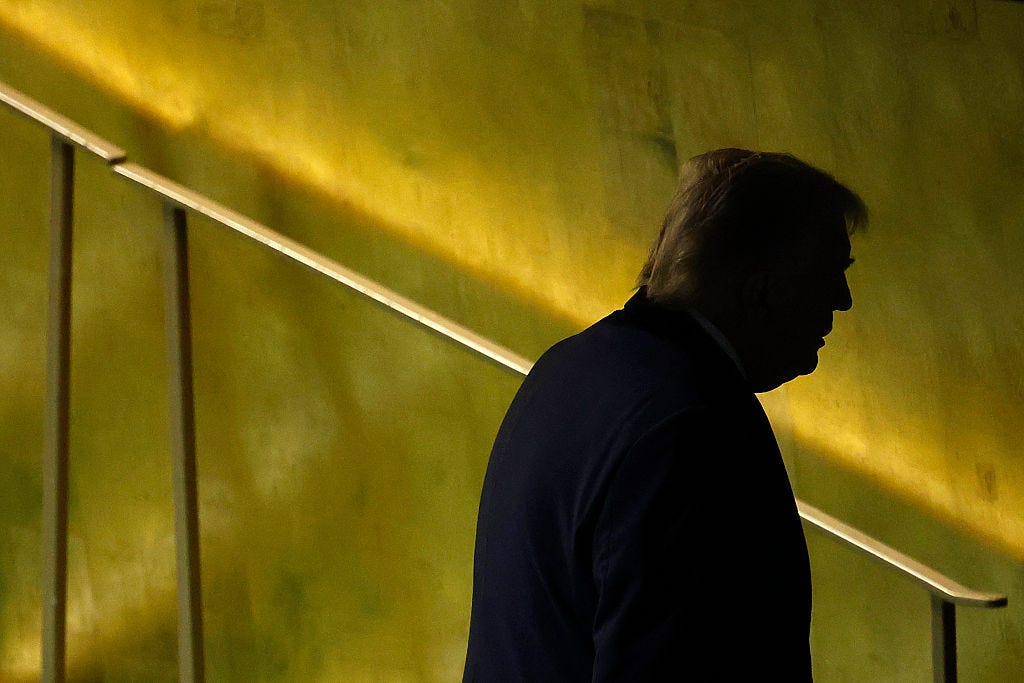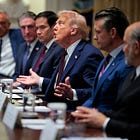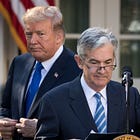When Strongmen Own the Store
Personal control over the economy is becoming Trump’s signature policy.

We habitually divide our political parties along the old lines that applied for many decades—but no longer apply now.
We think of the Democratic Party as a party of the American “left” that is hostile to the free market. They favor taxes, heavy-handed regulation, and centralized power over the economy. We still think of the Republican Party, the party of the “right,” as defenders of free markets. They want less regulation, lower taxes, and less power over the economy exerted from Washington, D.C.
This old way of thinking still accounts for a great deal of Donald Trump’s political support. It is how he maintained the support of the Republican establishment and its big donors. In the popular imagination, Trump is a successful businessman who wants the “pro-business” policies of lower taxes and less regulation, and he and his supporters continue to use the threat of “socialism” as an all-purpose bogeyman.
Even Trump’s authoritarianism seems like a selling point to some of these supporters, who are tempted by the idea that he can impose free-market policies that lack sufficient public support to get through Congress. This is one of the great illusions of authoritarianism. The supporters of a strongman see him as the battering ram to push through their long-stymied ideological agenda. They give him unchecked power so he can do the things they want him to do. But once he has that power, he does the things he wants to do.
There is an inexorable logic in authoritarianism that always turns strongmen against economic freedom and free markets. They fear competing centers of power, which includes independent sources of wealth and resources, particularly in the media industry, that might be used by their political opponents.
Donald Trump is no different, and he has already succeeded to a surprising degree in making himself the single point around which America’s economy revolves. His quest for economic control begins with an area where Congress has already given presidents wide authority: trade and tariffs.
Article I, Section 8 of the Constitution gives Congress the power “to lay and collect taxes, duties, imposts, and excises” and to “regulate commerce with foreign nations.” The Founders gave Congress the power to impose import duties because tariffs are a tax on trade and a form of revenue for the federal government. Congress controls tariffs because they have the power of the purse. As the most direct representatives of the people, the House of Representatives was given special power to originate any bill that raises revenue from the people.
Yet the last major bill in which Congress directly and specifically dictated tariff levels was nearly a century ago: the Smoot-Hawley Tariff Act of 1930. This was such a disaster, setting off a spiral of retaliatory tariffs that shut down international trade and deepened the Great Depression, that Congress largely divested itself of this authority. Beginning in 1934, it passed laws giving discretion to the president to negotiate tariffs.
This authority was not unlimited, and it was intended to support the reduction of tariffs. This was especially true after World War II, when America’s leaders regarded the restoration of trade as vital to rebuilding a stable international order. But as a concession to the advocates of protectionism, Congress frequently gave the president authority to increase tariffs on an “emergency” basis or on the grounds of national security. This power has been abused intermittently, but on a limited scale—until Trump.
Trump’s love for tariffs is partly ideological. One of his few fixed beliefs, going back decades, is that trade is bad for America and low tariffs allow other countries to take some kind of unfair advantage of us. The irony is that this is combined with nostalgia for the industrial economy of the mid-20th century—an era when the United States was leading the charge for free trade.
But Trump’s interest in tariffs is also personal. There is perhaps no other area of the government in which he so clearly exhibits the sheer joy of seeing his slightest whim instantly made into policy. He has set tariffs for the entire world, on a country-by-country basis, based on a nonsensical formula adopted literally hours before the announcement. This is how, in April, he ended up in a trade war with penguins, announcing 10% tariffs on the Heard and McDonald Islands, uninhabited except for flightless Antarctic birds.
Trump then delighted in doubling and tripling these tariffs, removing them one day and slapping them back on the next. As one Trump aide boasted to Politico, “It’s the greatest show on Earth. We’ll put tariffs on tonight, but tomorrow we’ll tell you we may negotiate and take them off. But stay tuned, because you never know what tomorrow’s gonna bring.”
More to the point, Trump now has American businessmen trooping to the White House or to Mar-a-Lago to ask for special carve-outs and exemptions for their businesses and industries. A typical example is Apple CEO Tim Cook supplicating Trump in the Oval Office and presenting him with a glass trophy with a 24-karat gold base—Cook made sure to mention the gold—after Trump granted Apple exemptions from tariffs on electronics imported from China.
Granting special exemptions from tariffs for specific products and industries—thousands of them so far—allows Trump to assert arbitrary power over a large portion of our economy. The only reason this is not recognized as “socialism” is because he maintains the fiction of private ownership. Vladimir Putin imposes a similar system in Russia, and so, for the most part, does Xi Jinping, even in supposedly communist China. The contemporary strongman recognizes that it is unnecessary and counterproductive to nationalize industries, so long as he retains the power to make or break individual businesses—and so long as the businessmen know it.
Yet occasionally Trump can’t help letting the mask slip. In an interview with Time Magazine, he explained his tariffs by comparing the U.S. economy to a department store:
We’re a department store, a giant department store, the biggest department store in history.... It’s a giant, beautiful store, and everybody wants to go shopping there. And on behalf of the American people, I own the store, and I set prices, and I’ll say, if you want to shop here, this is what you have to pay.
This is where Trump’s attempt to assert control over the economy begins, but it’s not where it ends.
In seizing the power of the purse from Congress, Trump has asserted an autocratic theory of the “unitary executive” that gives him direct control over agencies like the Federal Communications Commission and the Federal Trade Commission. He has denied the power of Congress to give agencies specific tasks to perform in a way that is insulated from his direct, day-to-day control. To exert this control, he has claimed the power to fire and replace the heads of these agencies, ensuring they will be dependent on him.
The most important of these agencies, from an economic standpoint, is the Federal Reserve, which sets interest rates and monetary policy. The stability and professionalism of the Fed is a key assurance to American businessmen and investors that they can predict the future and that their capital will not be eroded by runaway inflation.
Yet this is precisely what Trump is now threatening. He has floated the idea of firing Federal Reserve chairman Jerome Powell, one year before his term expires, and Trump has declared that he would do a much better job of setting interest rates: “I made a lot of money. I was very successful. And I think I have a better instinct than, in many cases, people that would be on the Federal Reserve—or the chairman.”
This is a typical pattern for an authoritarian strongman. Having seized power, he claims that he will deliver a golden age of growth and prosperity. To make good on that claim, he demands a “loose money” policy, lowering interest rates and increasing the supply of money to get a short-term boost in growth. Then the bill comes due in the form of high inflation.
This pattern was enacted most recently in Turkey under Recep Tayyip Erdoğan. In 2018, he complained that “the central bank can’t take this independence and set aside the signals given by the president” and thundered that its refusal to lower interest rates was the “mother and father of all evil”—essentially the same complaints Donald Trump is making now. The result of Erdoğan’s takeover of monetary policy was an immediate doubling of the inflation rate in Turkey, from about 11% to nearly 25%. Inflation has gotten even worse recently, hitting a high of 85% in 2022.
This is what happens when a strongman sets interest rates according to his “instinct” and for the purpose of consolidating power.
Trump is attempting to exert a similar level of power against big corporations and their CEOs. He has demanded that the CEO of Goldman Sachs fire the investment bank’s chief economist because he predicted—as virtually every economist would do—that Trump’s tariffs will raise the prices of goods. He targeted the CEO of Intel, Lip-Bu Tan, demanding he resign because Tan’s personal investments in China supposedly make him “conflicted.” Tan did not resign, but the threats had their intended effect. Intel agreed to sell the U.S. government a 10% share in the microchip manufacturer at a discounted price.
Then there is the agreement the Trump administration made last month with chipmaker Nvidia, which promised to pay the U.S. government 15% of all AI chip sales to China “as a prerequisite to obtaining export licenses for China.” There is, needless to say, no legal or constitutional authority for this arrangement. Export licenses are supposed to be granted when the government certifies that objective conditions have been met—not when it gets a kickback.
Partial state ownership is a hallmark of the so-called “state capitalism” model of the Chinese government. To make our transition to the Chinese model complete, all we need is state ownership of military contractors—and this is, in fact, the very next step. When he announced the 10% buyout of Intel, Trump indicated that he was interested in more such deals, and the next day his Secretary of Commerce floated the idea of the government taking ownership stakes in the big defense contractors.
We are used to thinking of free markets and capitalism as the established economic system, the status quo protected by conservatives and vested interests. But it is worth remembering that capitalism was once a radical new system that swept away the vested interests that came before it, replacing feudalism and aristocracy. Those are the older and more primitive economic systems Trump is attempting to revive.
Trump’s conservatism is not an ideological conservatism, but rather a reactionary rejection of the entire modern world. In its place, he wants to return to a pre-modern system centered around a king or chieftain, where anyone who wants to start a business or trade goods has to show the local boss their obedience—and pay him a bribe. The most extreme version of this system is patrimonialism, in which an entire country, and everyone in it, is regarded as the personal property of the ruler. He literally owns the store.
Donald Trump is pushing us back, one step at a time, toward that kind of system.
Robert Tracinski publishes commentary at The Tracinski Letter and is the author of Dictator From Day One: How Donald Trump Is Overthrowing the Constitution and How to Fight Back.
This article is adapted from “Dictator From Day One: How Donald Trump Is Overthrowing the Constitution and How to Fight Back.”
Follow Persuasion on Twitter, LinkedIn, and YouTube to keep up with our latest articles, podcasts, and events, as well as updates from excellent writers across our network.
And, to receive pieces like this in your inbox and support our work, subscribe below:







Democrats teach hate and pretend it’s black history. This Real Clear Investigations article below from 2020 is about the “1619 Project” and what the author Nikole Hannah-Jones told the editors of the Chicago Tribune about its purpose which is, she said, to instill guilt in white liberals so they will support reparations for blacks. White liberals are not being targeted though. White children in our public schools are. And Woke white leftists love this and are totally supportive of it. She was even given a Pulitzer Prize for this poison in 2020. This is not “black history” though. This is anti-white hate mongering pretending to be history to instill guilt to gain support for reparations. This is evil and this is what the democrats have become. And these are the same people who say they simply can’t understand why so many people voted for Trump.
“If you read the whole project, I don’t think you can come away from it without understanding the project is an argument for reparations,” she told the Chicago Tribune in October.
“I'm not writing to convert Trump supporters. I write to try to get liberal white people to do what they say they believe in,” she said. “I'm making a moral argument. My method is guilt.”
“Disputed NY Times ‘1619 Project’ Already Shaping Schoolkids Minds on Race.”
Real Clear Investigations. Jan 31, 2020
https://www.realclearinvestigations.com/articles/2020/01/31/disputed_ny_times_1619_project_is_already_shaping_kids_minds_on_race_bias_122192.html
Anglo aristocracy, both in England and the US was perfectly aware of the risk that implies autocratic rule. College educated WASPs in the late XIX and early XX century perfectly understood that no amount of tax cuts would ever justify the expropiation risk that any autocrat implies. That wisdom was lost later on.